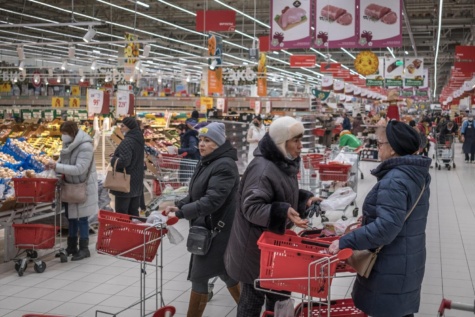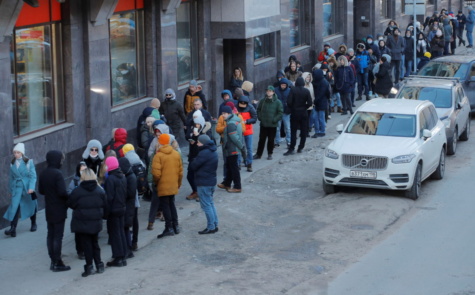
Austin Ashizawa | Student Life Editor
March 4, 2022
When Russia began its brutal military assault on Ukraine on February 24, the onslaught of devastating explosions shattered the lives of millions of Ukrainian citizens. Simultaneously, the conflict has shaken the world into a feeling of uncertainty that has not been felt since World War II. Yet unlike that infamous war, nations can’t expect to solve it with retaliatory strikes or attacks due to one horrific prospect: mutually assured destruction. With the existence of nuclear weapons ruling out many aspects of a traditional war, countries including the United States have now turned their attention primarily to subduing Putin’s nationalistic regime through financial pressure and isolation.
Immediately making their opposition known, the U.S. was expedient in striking Russia with a slew of hefty sanctions. As Putin continues to display a deranged sense of ambition to achieve his goals, these sanctions continue to grow. The White House has attempted to put obstacles in Russia’s way by, for example, enforcing extreme export blocks on technology. The hope is that this will serve to limit the possibility of Russia developing even more technologically advanced weaponry that could be used against the Ukrainians or other countries.
The United Kingdom chose to respond by freezing all assets in Russian banks. “We will continue on a remorseless mission to squeeze Russia from the global economy, piece by piece, day by day, and week by week,” Prime Minister Boris Johnson said in a powerful statement that affirmed the global community’s stance on how far these sanctions will go.
But because Russia is also a substantial international exporter of oil, many countries have recognized that sanctioning the nation could spell doom for their own economies. The Biden administration announced that it does not “have a strategic interest” in completely boycotting Russian oil, which could drastically hike up current gas prices and create a global energy deficit. “We are already seeing some of the economic impacts of sanctions on Russia,” senior Kristian Rorvik said. “Gas prices rose another 30 cents per gallon here in California where it was already super expensive.” There may be a time when the country can finally loosen the last hold of assurance that Russia has over the United States, but for now, the White House has explained that it is weighing the costs and benefits of any large-scale action.

Surprisingly, the economic attacks on Russia don’t just stem from international governments. As we have seen over the past few days, international corporations have joined the cause. On March 1, Nike and Apple closed their online stores and halted exports to Russia, with many of their products expected to run out in the coming weeks. Additionally, Apple CEO Tim Cook announced that the tech giant would be donating to charities to help Ukrainians during the war. “This moment calls for unity, it calls for courage, and it reminds us that we must never lose sight of the humanity we all share,” Cook explained.
As for how all of these developments will affect the economy, there is still uncertainty. However, chaos is undoubtedly beginning to brew. “These [sanctions] are not a good deterrent because they are impacting the Russian people more than Putin and the oligarchs,” Rorvik said. “The truth is that for the time being, the average citizen seems to have sustained more damage than the higher-ups in Russia.”
With so many Russian assets being frozen and The Russian Central Bank unable to prop up the Ruble with excess funds, the value of one Ruble plummeted to a value of less than one cent in USD. Interest rates were doubled to almost 20%, and thousands of Russians were forced to rush and withdraw money from ATMs. “Inflation will continue to ramp up, and the prices of imported goods, notably technology such as phones, cars, and computers, will follow,” sophomore Anthony Wu said.
When Russia initially began its “special military operation” against Ukraine, many speculated that China would try to take advantage of the situation and launch their assault on Taiwan after years of claiming ownership of the country. However, with sanctions continuing to suffocate Moscow and large numbers of Russian protestors, the case of China’s potential aggression will come at a cost. “I believe that, though sanctions do act as deterrents, the more you rely on them, the less effective they become,” Wu speculated. “It’s unlikely that [China] will be deterred, but instead wait for the right moment to strike.”
Regardless of how much long-term effect these sanctions, embargoes, and boycotts have in continuing to damage the Russian economy, it is clear that for now, it seems to be the only option if the world is to avoid an all-out nuclear fallout.

Leave a Reply